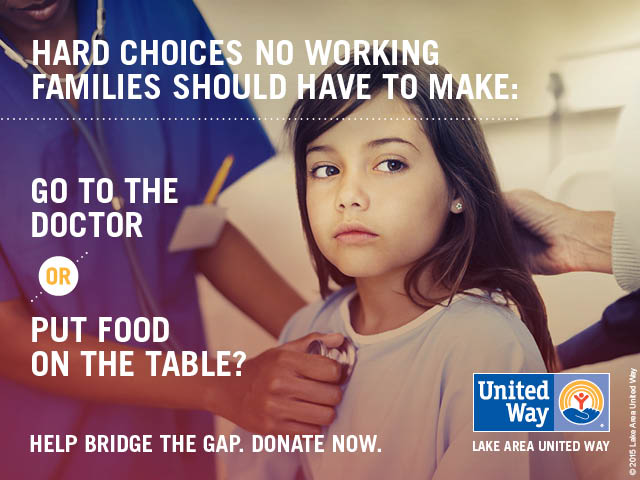Lake Area United Way has been making significant changes to its business model over the past year while focusing on helping families who are struggling to afford very basic necessities.
“We are moving from the traditional United Way model to a Community Impact Model,” Lisa Daugherty President and CEO of the Lake Area United Way (LAUW) said. “This model focuses on mobilizing the caring power of communities to create lasting changes in community conditions that improve lives. It brings together cross-sectors of the community to take a unified and collective approach to the root causes of systemic issues with our community. It’s our intention to focus on a single issue or root cause in coming years. That issue is struggling working families.”
LAUW conducted thorough research on complex social issues that residents in Lake County are facing. They found that households described by the acronym ALICE (Asset Limited, Income Constrained, Employed) are living just above poverty level and need help. In fact, one in four families in Lake County is in financial peril, even though they are working.
“Since they are just above poverty level, these families don’t qualify for certain types of assistance,” Daugherty said. “Our plan in coming months is to meet with these families, understand their needs, and then meet with partners in the community to identify strategies to address those needs.”
LAUW plans to diversify its fundraising streams, look for grants, and secure more individual donors. Their community investment process will be focused around one single issue, the ALICE population, and the way that their member agencies are funded will be changing.
“We have a Community Investment Committee made up of local, community volunteers who will decide which agencies and programs get funded. We aren’t looking to cut funds, but instead, we will start with the issue – struggling working families – and then we will determine funding for agencies based on how they support that population.”
In addition to funding available for the issue, a Capacity Building Program will be available to member agencies that will include training workshops on a variety of subjects to help the agencies build their operational and leadership capacity.
LAUW still plans to support basic needs organizations, setting aside 20 percent of its funds for agencies who provide support for basic needs such as food and shelter. Meals on Wheels, Salvation Army, the Red Cross, and domestic violence shelters are just a few examples of those agencies who will receive basic needs funding.
Additionally, an emergency fund will be available in the event an agency is experiencing a significant hardship they didn’t anticipate. “It’s important to us that we are not creating a hardship for these agencies. This will be a three-year process to step down traditional funding,” Daugherty said.
“So far, the response to the transition has been overwhelmingly positive from both the community and member agencies,” according to Daugherty. “The community seems to recognize that LAUW needed to make a change to its model.” Daugherty cited two key drivers for the change:
1. Sustainability of the United Way model. The campaigns for United Ways, including LAUW, have been declining over time. People are far more knowledgeable and particular about what organizations and causes they donate to and less reliant on the United Way for help in scrutinizing charitable work. Companies are creating more private foundations and they are encouraging employees to support their own issues of interest. A third reason is technology. People can pick up their smart phones and donate to GoFundMe causes or other online projects within a few clicks. Locally, another reason is the changing employer landscape. Large employers are more efficient in their operations, therefore require fewer employees. That impacts giving.
2. Unchanging community conditions. LAUW has invested over $100 million into the community in the last 20 years, but community conditions haven’t really changed in a meaningful way.
“The need is as great as ever,” Daugherty said. “We’re not investing enough in attacking the root causes of issues in our community. Our intention is to identify the cause, which we’ve already done, come to the table as a backbone organization, coordinate multiple partners on this issue, and go after the root causes of family instability. About 50% of United Ways our size have moved to this business model and they are seeing great success from it. It’s an enormous undertaking, but the community has been supportive. That keeps us enthused.”
For more information visit http://www.lauw.org/, find the LAUW on Facebook, follow them on Twitter, or check them out on YouTube.

